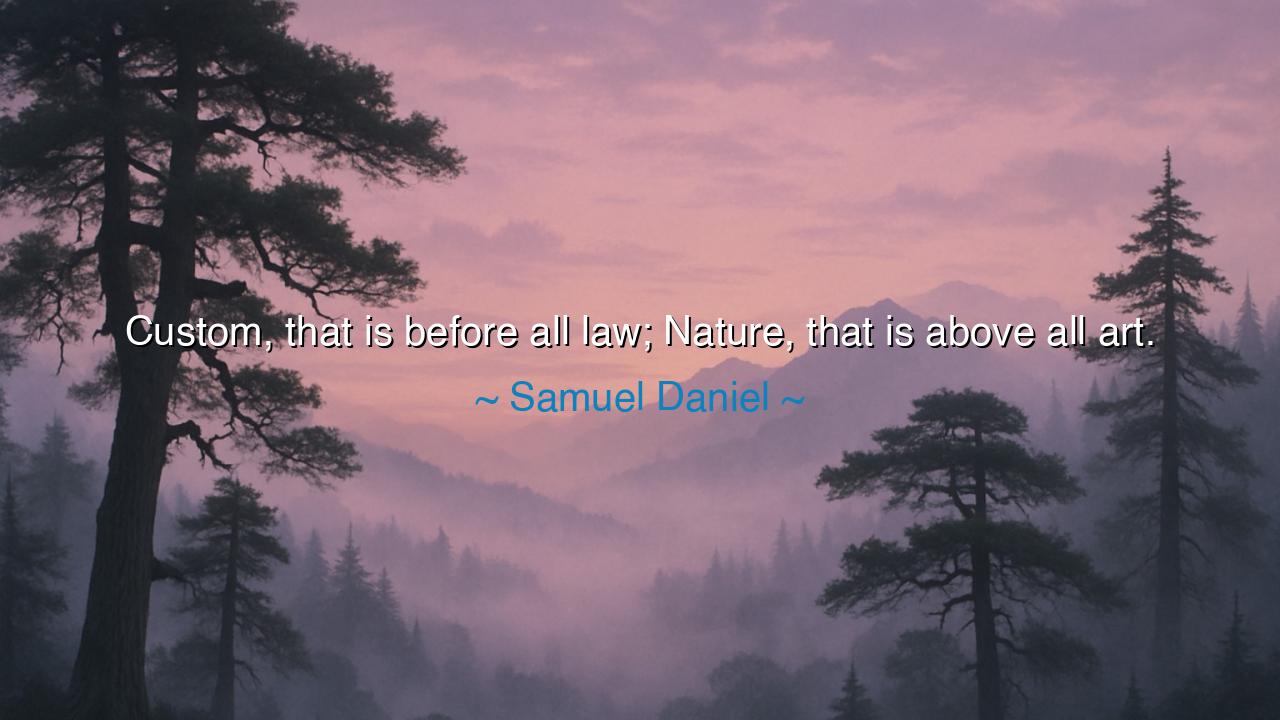
Custom, that is before all law; Nature, that is above all art.






Samuel Daniel once proclaimed: “Custom, that is before all law; Nature, that is above all art.” These words, born in the age of Elizabethan thought, resound like the voice of the ancients themselves. They speak not only of statutes and arts, but of the deep order of the world, reminding us that human invention is but a shadow, and that what truly governs life is older, deeper, and more enduring than any decree or creation.
The first truth is this: Custom is before all law. Long before kings wrote edicts on tablets, long before parliaments carved codes into books, there were the unspoken traditions of the people. Men tilled the earth, women wove the cloth, tribes gathered by fire — and in their daily ways, the patterns of life became the first unwritten law. A nation’s customs are the soil from which its laws spring. A statute may bind for a time, but if it runs against the deep current of custom, it cannot endure. Thus Daniel teaches that no ruler can truly govern who does not understand the habits, rituals, and living memory of his people.
And then, the second truth: Nature is above all art. For what is art but the imitation of the world, shaped by human hands? Yet the rivers flowed before the painter traced them, and the flowers bloomed before the poet sang their names. Art refines, art adorns, art gives echo to the beauty of existence — but it can never rise higher than the eternal majesty of Nature, which is its source. As the sun does not borrow light from the candle, so too does Nature not borrow glory from art, but rather, art borrows from her.
History itself bears witness. Consider the laws of Rome: the emperors could proclaim decrees, yet if they defied the ancient customs of the people — their festivals, their rites, their ways of family and kinship — rebellion and ruin followed. Or look to the Renaissance, where the arts flourished like a garden. Even Michelangelo, whose chisel drew forth the face of angels from marble, could only unveil what Nature had hidden within the stone. His art bowed before Nature’s design, and from that humility came greatness.
The meaning of Daniel’s words is therefore a double lesson in humility. For rulers, it is to remember that law without custom is tyranny, brittle and doomed to break. For artists, it is to remember that art without Nature is vanity, empty and without root. Both must return to what is older, deeper, eternal. The wise ruler governs by honoring tradition, the wise artist creates by reverencing the world as it is.
This teaching is not only for kings and poets but for us all. In our daily lives, let us not despise custom: the family rituals, the rhythms of community, the practices that bind generations. These give order to our days and stability to our hearts. And let us not forget Nature: the fields, the forests, the rivers that sustain us. To honor Nature is to live in harmony, to know that our creations are fleeting compared to the eternal earth.
The lesson is clear. Seek not to overturn custom without wisdom, for it is the foundation of society. Create not art that forgets Nature, for it will ring hollow. Instead, stand in reverence before these pillars: custom as the root of law, nature as the crown above art. In your own life, practice gratitude for traditions that have shaped you, and walk with humility in the face of the natural world.
Thus Samuel Daniel’s words endure: “Custom, that is before all law; Nature, that is above all art.” They call us to balance — between what men make and what is eternal, between what is written and what is lived. If we heed them, we will walk wisely, rooted in the strength of ages, yet lifted by the beauty of the earth itself.






AAdministratorAdministrator
Welcome, honored guests. Please leave a comment, we will respond soon